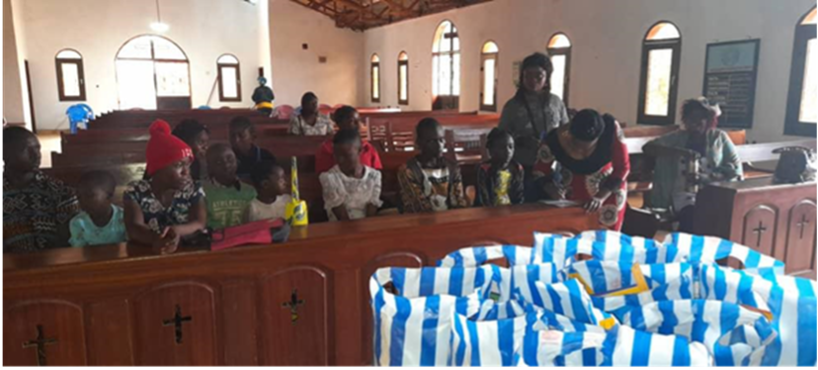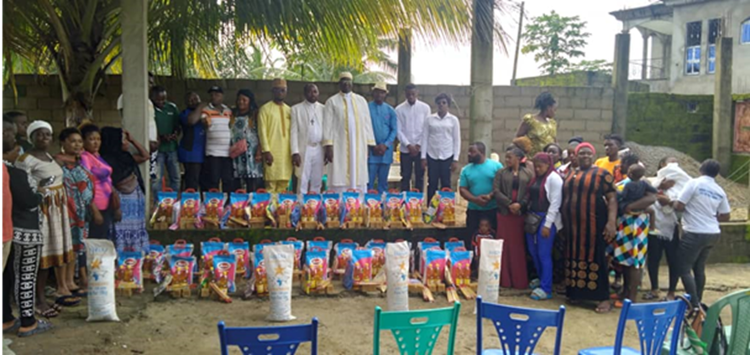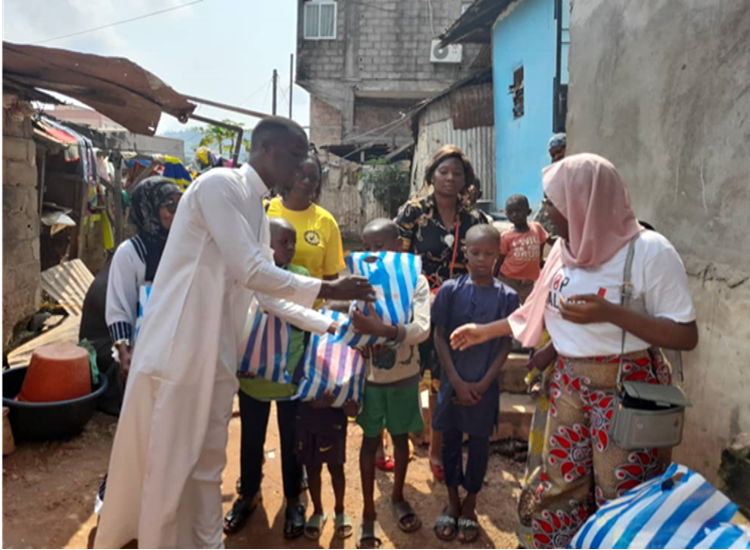Religions for Peace’s Multi-Religious Humanitarian Fund Supports Emergency Humanitarian Assistance to Refugees and Internally Displaced Peoples by Cameroonian Association for Interreligious Dialogue (ACADIR)
“Situations of forced displacement drastically impact all aspects of life; those affected almost never chose the circumstances under which they find themselves under. As religious leaders, we are constantly faced with situations of urgent and immediate need, especially in crisis,” shared Rev. Mbog Baya Jean Moise of ACADIR. “…crisis doesn’t choose whether you are a Muslim of Christian,” adds Sheikh Feisal Munir.
“We are called upon to respond to human needs during conflict situations. Our situation in Cameroon is therefore no different in that children and women are mostly affected. People run to us as religious leaders for help not realizing that we are also in the same predicament as them!” Sheikh Feisal continues as he adjusts his cap, which seems to be nodding separately in approval of his observations.

Both Rev Mbog and Sheikh Feisal are members of the Cameroonian Association for Interreligious Dialogue (ACADIR)which is an affiliate of Religions for Peace in Cameroon. After having enjoyed several decades of stability, Cameroon has, in recent years, been grappling with violent extremism in the Far North and secessionist insurgency activities in some regions. Since September 2017, the conflict has displaced more than 1 million internally and around 470,000 refugeeshave sought shelter in Cameroon, which hosts over 60% of Central African refugees. According to the 2023 report of the United Nations Office for the Coordination of Humanitarian Affairs (OCHA), 15,130 people in this region were displaced due to violence in January alone.
Congregational and regional religious leaders consistently find themselves faced with humanitarian situations that require the quick mobilisation of humanitarian response and actions. Citizens in distress flock to places of worship for assistance. However, these places of worship – local churches, mosques, temples, etc. – are rarely equipped to respond to humanitarian situations. In fact, several places of worship have been targeted as well. As such, when Religions for Peaceinvited its networks to apply for seed funding through the Multi-Religious Humanitarian Fund (MRHF, or “the Fund”), ACADIR was among the first to respond.
“When we heard that Religions for Peace was providing support to communities facing conflict or displacement situations, we saw this as an answer to prayer” recalls the executive member of ACADIR. “We responded by making an application for the provision of basic necessities and educational materials to internally displaced persons (IDPs) and children in the locality of Bodjongo London City in Bonabéri. There was also a need to equip religious leaders and our communities to support birth registration as a right to the children facing displacement,” continues Sheikh Feisal.
As an interfaith platform that brings together Catholic, Protestant, and Muslim leaders for dialogue and collaboration on peacebuilding, ACADIR plays an instrumental role in promoting peace within and beyond Cameroon. ACADIR focused on three main areas of humanitarian assistance: food insecurity, disruptions to education, and child protection.
Through the support from Religions for Peace, ACADIR was able to provide food and emergency subsistence assistance reaching 300,000 people. This support was primarily in the form of food cash and meal voucher assistance. In addition, the support enabled the distribution of basic necessities, such as food kits (consisting of maize, beans, rice, and salt), as well as personal hygiene and sanitation kits (including soaps, laundry powder, and metal pad sponges).

The conflict has also hindered education for countless children, as an estimated 54% of schools are still closed, leaving children with limited access to core resources for education and development. Having identified the urgent need to restore children’s access to education, ACADIR provided 1,000 internally displaced children in need of emergency education with basic school materials and meal vouchers.
“Despite the disruptions to learning brought about by displacement, we were able to provide children with schooling, as well as basic supplies such as pens, rulers, notebooks, and textbooks. In addition, ACADIR also provided mental health services to facilitate the process of trauma healing for IDPs and children. This was very important especially for recovery,” shared Rev Mbog.
ACADIR mobilised efforts to ensure that births of displaced children are registered with the government, so that they are eligible to receive aid or services from the government. Through the support, 10 local community leaders were trained in birth registration. As a result, their communities are now benefiting from their children being legally registered, who are thus eligible to receive support and aid from the government.
“We are usually the first ones to assess and respond to situations before the government and others come. Without the support, we wouldn’t have been able to step in and assist,” shared Sheikh Feisal.

ACADIR continues to care for refugees and IDPs most affected by ongoing violence in Cameroon. Through this support alone, ACADIR brought together local religious and faith communities to meet the needs of their displaced neighbors. Together, the communities served to form a coordinated project team to oversee ACADIR’s provision of humanitarian aid in the region, start a systematic record of people and families in the region who are in need of aid, and bring refugees and IDPs together to cultivate solidarity and belongingness.
Religions for Peace continues to play an integral role in ensuring that affiliates like ACADIR are equipped to continue strengthening multi-religious collaboration in the country, and providing humanitarian assistance to IDPs, children, and the most vulnerable populations within and beyond Cameroon.
The work of organisations like ACADIR has a great and lasting impact on the lives of the most vulnerable populations. Through the Multi-Religious Humanitarian Fund, Religions for Peace supports interfaith initiatives that provide lifesaving assistance to millions of people who are affected by conflict and other global crises. We ask that you consider giving a gift today, so that we may continue supporting interfaith initiatives that make the world a better place.